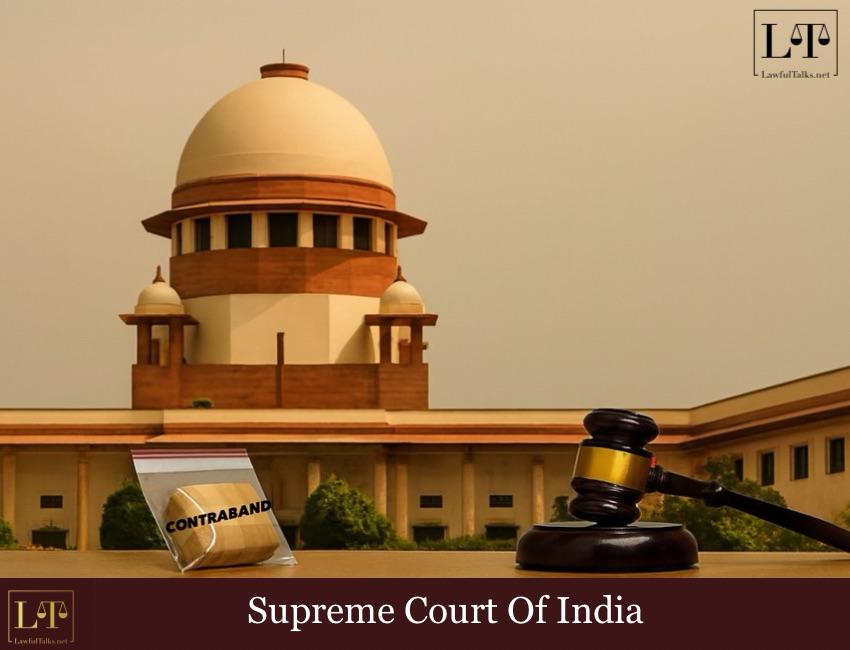Allahabad HC Sets Aside Afzal Ansari's Conviction, Allows Him to Continue as MP

The Supreme Court of India has held that, in cases under the NDPS Act, the prosecution is not weakened simply because the seized narcotics were not physically produced before the trial court, provided the requirements of Section 52-A have been properly followed.

A bench of Justice Manoj Mishra and Justice Ujjal Bhuyan set aside an order of the Nagpur Bench of the Bombay High Court, which had directed a retrial on the ground of non production of the bulk contraband and other procedural deficiencies. The Apex Court held that such action was not justified or valid.
“Mere non-production of the seized contraband during trial may not be fatal if there is reliable evidence in respect of its seizure, drawing of samples therefrom, and FSL report relating to the sample drawn from the seized material. However, to ensure that no adverse inference is drawn against the prosecution for non-production of the seized contraband, documents prepared in terms of the provisions of Section 52-A, inter alia, evidencing preparation of inventory of seized contraband and drawing of samples therefrom, would have to be brought on record.” the court emphasized.
Facts:
The case was based on an organised raid, where nearly 147 kg of ganja was seized. The trial court had convicted two of the four accused persons, including the appellant, and acquitted the other two.
In the appeal, the High Court ordered a retrial on the basis of lapses, including that the bulk contraband was not produced in court, the chemical examiner was not examined, and that the video showing the raid was not played during the testimonies of the witnesses.
In rejecting the High Court's reasoning, the decision authored by Justice Manoj Misra stated that non-production of the entire seized contraband does not mean that the prosecution's case was automatically fatal by virtue of the inventories, sealed samples, and FSL reports being properly prepared under Section 52A of the NDPS Act.
The Court noted that the trial material evidenced that the entire seizure process was properly documented to prove a connection between the seizure and results from forensic testing, and thus non-production was not fatal to the prosecution's case.
“From above, prima facie, there existed material to indicate that the seized contraband was sent in a sealed condition for preparation of inventory. Thereafter, inventory was prepared, samples were drawn and sealed; and the samples were sent to FSL in a sealed condition, which found the seal intact.”, the court observed
The court referred to Jitendra and Another v. State of M.P (2004) 10 SCC 562, State of Rajasthan v. Sahi Ram (2019) 10 SCC 649 etc. to the effect that while production of the seized material is preferred, non-production, where there is reliable evidence in respect thereof, is insufficient to dismiss the prosecution's case.
Addressing the High Court’s concern that the video evidence of the raids was not properly admitted, the Supreme Court explained that since the creator of the video had supplied the necessary certificate under Section 65B(4) of the Evidence Act, the electronic record was admissible.
The Court made it clear that neither the law nor precedent mandates that such recordings must invariably be played during each witness’s testimony or transcribed into writing.
“The High Court, however, observed that the representative sample was not opened before the Court at the time of recording of the statement of the concerned witness. Be that as it may, this was not a ground to direct for a retrial when the appellate court has power to take additional evidence under Section 391 of CrPC, which, inter alia, can be exercised to exhibit a document or material already on the record of the Court. And if those defects are fatal to the prosecution, the appellate court is free to take its decision as may be warranted in the facts of the case. But, in any event, it cannot be a ground to direct a re-trial.”, the court stated.
Consequently, the appeal was granted. The Supreme Court overturned the High Court's order for retrial, remitted the matter back to the High Court for a fresh hearing within six months.
Case Title: KAILAS S/O BAJIRAO PAWAR VERSUS THE STATE OF MAHARASHTRA
Appearance:
For Petitioner(s) :Mr. Anil Mardikar, Sr. Adv. Mr. Sachin Shanmukham Pujari, AOR
For Respondent(s) :Mr. Aditya Krishna, Adv. Mr. Siddharth Dharmadhikari, Adv. Mr. Aaditya Aniruddha Pande, AOR Mr. Shrirang B. Varma, Adv.

Nikita Muddalgundi
Second Year, B.A. LL.B student
Latest Posts
Categories
- International News 19 Posts
- Supreme Court 352 Posts
- High Courts 366 Posts




























































































































































































































































































































































































































































































































































































































































































































































